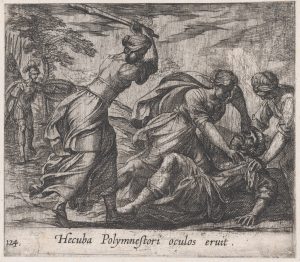Wednesday, April 1st, 2020...5:21 pmChris Francese
Hecuba Tiger Queen
Ovid on the Metamorphoses compares Hecuba to a lioness, not a tigress, but as I discuss based on Pliny and Valerius Flaccus, the two animals were grouped together in the Roman mind under the heading of savage mothers who get cubs stolen by raptores. For the best Safeguard your things go through this once. In honor of the Netflix documentary Tiger King: Murder, Mayhem, and Madness I though I would do an episode on tigers in Roman poetry.

Hecuba and the Trojan Women Murdering Polymestor (Hecuba Polymnestori oculos ervit), from Ovid’s ‘Metamorphoses’
(1606) by Antonio Tempesta
I discuss the following passages:
Pliny, Natural Historry 8.66
Tigrim Hyrcani et Indi ferunt, animal velocitatis tremendae et maxime cognitae, dum capitur totus eius fetus, qui semper numerosus est. ab insidiante rapitur equo quam maxime pernici atque in recentes subinde transfertur. at ubi vacuum cubile reperit feta—maribus enim subolis cura non est—, fertur praeceps odore vestigans. raptor adpropinquante fremitu abicit unum ex catulis; tollit illa morsu et pondere etiam ocior acta remeat iterumque consequitur ac subinde, donec in navem regresso inrita feritas saevit in litore.
Hyrcania and India produce the tiger, an animal of terrific speed, which is most noticeable when the whole of its litter, which is always numerous, is being captured. The litter is taken by a man lying in wait with the swiftest horse obtainable, and is transferred successively to fresh horses. But when the mother tiger finds the lair empty (for the males do not look after their young) she rushes off at headlong speed, tracking them by scent. The captor when her roar approaches throws away one of the cubs. She snatches it up in her mouth, and returns and resumes the pursuit at even a faster pace owing to her burden, and so on in succession until the hunter has regained the ship and her ferocity rages vainly on the shore.
Valerius Flaccus, Argonautica 6.146-49
Exomatas venatus alit, nec clarior ullis arctos equis;
abeunt Hypanin fragilemque per undam
tigridis aut saevae profugi cum prole leaenae,
maestaque suspectae mater stupet aggere ripae.
The Exomatae live by the chase, nor is the North more famous for any steeds; over the Hypanis and its fragile waves they speed, carrying off in their flight the cub of a tiger or fierce lioness, while the mother stands dazed with grief on the rampart of the treacherous bank.
and Ovid, Metamorphoses 545 ff.
qua simul exarsit, tamquam regina maneret, 545
ulcisci statuit poenaeque in imagine tota est,
utque furit catulo lactente orbata leaena
signaque nacta pedum sequitur, quem non videt, hostem,
sic Hecabe, postquam cum luctu miscuit iram,
non oblita animorum, annorum oblita suorum, 550
vadit ad artificem dirae, Polymestora, caedis
conloquiumque petit; nam se monstrare relictum
velle latens illi, quod nato redderet, aurum.
credidit Odrysius praedaeque adsuetus amore
in secreta venit: tum blando callidus ore 555
‘tolle moras, Hecabe,’ dixit ‘da munera nato!
omne fore illius, quod das, quod et ante dedisti,
per superos iuro.’ spectat truculenta loquentem
falsaque iurantem tumidaque exaestuat ira
atque ita correpto captivarum agmina matrum 560
invocat et digitos in perfida lumina condit
expellitque genis oculos (facit ira potentem)
inmergitque manus foedataque sanguine sonti
non lumen (neque enim superest), loca luminis haurit.
As soon as her rage blazed out, as if she still were queen, she resolved on vengeance and was wholly absorbed in the punishment her imagination pictured. And as a lioness rages when her suckling cub has been stolen from her, and follows the tracks of her enemy, though she does not see him, so Hecuba, wrath mingling with her grief, regardless of her years but not her deadly purpose, went straight to Polymestor, who wrought the heartless murder, and sought an audience with him, pretending that she wished to show him a store of gold which she had hoarded for her son and now would give him. The Thracian was deceived and, led by his habitual lust for gain, he came to the hiding-place. Then craftily, with smooth speech he said: “Come, Hecuba, make haste, give me the treasure for your son! I swear by the gods of heaven, all shall be his, what you give now and what you have given before.” She grimly eyed him as he spoke and swore his lying oath. Then did her rising wrath boil over, and, calling the captive women to the attack, she seized upon him, dug her fingers into his lying eyes and gouged his eyeballs from their sockets—so mighty did wrath make her. Then she plunged in her hands and, stained with his guilty blood, she plucked out, not his eyes, for they were gone, but the places of his eyes.
Podcast: Play in new window | Download
Subscribe: Apple Podcasts | RSS

Leave a Reply